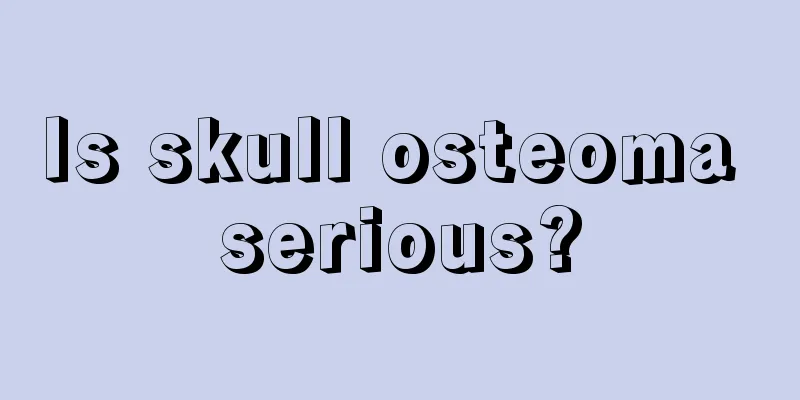Is skull osteoma serious?

|
The brain is the central organ of the human body. All human actions are controlled by the brain. However, if you often engage in high-pressure work and do not pay attention to rest, the brain is prone to lesions. The most serious is skull osteoma. Although skull osteoma is a benign tumor, it can also damage brain cells and brain mucosa. The osteoma must be removed in time. If it is not treated in time, the osteoma will grow with the changes in the body and the situation will become more serious. Osteoma of skull is a common benign tumor that often protrudes on the bone surface. Since the skull vault is a membranous ossification and the skull base is endochondral ossification, osteomas in the skull vault are more common than in the skull base, especially in the frontal and parietal bones. Causes The cause of skull osteoma is still not very clear. Most of them are natural growths, and some are related to trauma. Most tumors originate from the outer plate of the skull, grow slowly, and sometimes stop growing on their own. Classification It can be divided into dense type (most common, mostly originating from the outer plate of the skull, while the inner plate mostly remains intact) and cancellous bone type (mostly originating from the laminae and growing in an expansive manner). Clinical manifestations 1. It is common in young and middle-aged people aged 20 to 30 years old, with a long course of disease and no difference between men and women. 2. Most of them are painless skull tumors discovered accidentally or accompanied by mild discomfort. The main symptoms are local lumps, headaches, local pain, dizziness and exophthalmos. 3. It often affects the outer plate of the skull, and may cause local raised lumps that are hard, not adhered to the scalp, smooth in surface, with clear boundaries, inactive, and occasionally tender. There is no redness or swelling of the local scalp, and most of the time there is no discomfort. 4. The lamellar type often has expansive growth, unclear boundaries, and widespread bulging of the skull. 5. Larger inner plate types may cause symptoms of high intracranial pressure and localized neurological dysfunction. 6. Orbital osteoma may cause exophthalmos and decreased vision. examine 1. Head X-ray The dense type is round or oval, with clear boundaries, localized high density, and a dense and consistent internal structure, while the cancellous bone type has uneven internal density. 2. CT The dense type is a round or oval high-density tumor with smooth and sharp edges connected to the normal bone cortex, accompanied by outward displacement of local skin or soft tissue; the cancellous bone type has uneven internal density. 3. MRI (Magnetic Resonance Imaging) The dense type has low or no T1 and T2 signals and is continuous with the bone cortex without any gaps. |
<<: Is it serious to have a bone tumor on the head
>>: What to do if you sprain your waist
Recommend
Can applying banana on the face remove acne?
Banana is a fruit that can beautify and whiten th...
Why do people get thyroid cancer? What are the ways to prevent thyroid cancer?
There are many causes of thyroid cancer, such as ...
Tooth endodontic root canal treatment helps relieve
Teeth are the strongest part of the body, and it ...
A collection of cookies without butter
Small cookies are a good choice for afternoon tea...
How to eat black rice
The appearance of black rice is very similar to t...
What is the difference between raw cassia seeds and cooked cassia seeds
Some friends cannot distinguish between raw Cassi...
What does narcissism mean? It turns out that doing this often is narcissism
The word narcissism is a word that people often e...
There are intermittent pains in the upper abdomen
What's causing the intermittent pain in my up...
Treatment of ankle avulsion fracture
I believe some friends have had such an experienc...
What harm does nuclear radiation do to the human body
With the continuous development of science and te...
What are the symptoms of mid- to late-stage pancreatic cancer?
As more and more pancreatic cancer patients are d...
Chrysanthemum tea production process
Chrysanthemum tea is a common type of tea and is ...
Can squatting and standing up help slim down your legs?
This movement is very useful for slimming legs an...
What is the reason for uneven little fingernails
Nails are generally smooth and shiny. If there is...
The dangers of narcissism, you need to know these
Narcissism is usually more serious in women. Ther...









